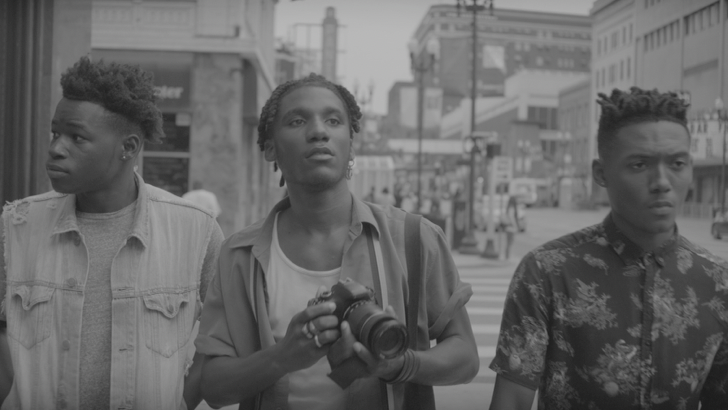Recently, I had the opportunity to attend the virtual Minneapolis-Saint Paul International Film Festival, specifically a showing of short films about activism. While I watched several shorts, it was the gut-wrenching work of Director E.G Bailey in his film “Keon” that still has me reflecting on anti-Black violence in the United States and the racial climate in Minneapolis.

In this 27 minute black and white short film, viewers are introduced to Keon, a young black photographer who spends the day in Minneapolis trying to acquire a new camera so that he may finish his portfolio — a necessary component of his college application. One becomes quickly enamored with the playful, joyous, and talented Keon as he spends the day taking photos of his brothers and friends in Minneapolis.
Throughout the short film, however, viewers are exposed to the erasure of Black joy. Throughout the film, White men approach Keon asking him to stop taking photos and leave public areas. For example, Keon is asked to stop taking pictures on the metro, Keon and his friends are asked to leave a coffee shop, and Keon is even chased out of a yard — all by White men.
What viewers witness is the erasure of Black bodies from public spaces throughout the city, and simultaneously, they watch Keon’s spark diminish slightly each time he is asked to take his passion for photography elsewhere. The short ends abruptly and dramatically when two White police officers stop Keon and his brothers, walking through what appears to be a back alley in South Minneapolis. Keon slowly raises his hands at the law enforcement officers’ requests — showing a slight hesitancy as his camera is in his hands. But it is at that moment; the two officers mistake his camera for a gun — shooting Keon dead in the alley.
“Keon” is a powerful film. E.G. Bailey carefully crafts this important narrative– a narrative known all too well by Black Americans. But this film is not just about the current epidemic in this country of law enforcement officers killing Blacks. This film is about the erasure of Black joy and Black bodies from our public spaces. Throughout the film, viewers are struck by how often Keon and his friends are asked to vacate public spaces. They are seen as loud and unruly — despite the fact they are simply attempting to compile a college entrance portfolio.
Two other shorts only strengthen this underlying message about erasure found in “Keon” in the Activism category: “Never Turn Your Back to the Wave — The Travis Jordan Story” and “Ignited States.” These two films continue to document police killings of Black men in Minnesota.
The first tells the story of Travis Jordan, who when two rookie White cops killed when they responded to a wellness call. The county has ruled the death justified. “Ignited States,” directed by Jud Nichols, continues the narrative of anti-Black violence in its documentation of the protests and speeches of politicians in the aftermath of the murder of George Floyd. It respectfully documents the South Minneapolis community’s confusion, grief, anger, and hope for change. It challenges the state’s response to protests, concluding with a simple message: “you can’t protect without love.”
Together, these activism shorts relay powerful messages about White violence against Blacks in America, specifically in Minnesota. While highlighting police brutality, these shorts illustrate the depth of the issue; violence against Black Americans does not just happen at the hands of the police; it occurs through everyday actions and attempts to remove Black joy from the public sphere. The impact of these films are especially poignant in the wake of last year’s recorded murder of George Floyd and the extrajudicial killing of Winston Smith earlier this year. These police killings and the films in which they tragically inspired have provoked difficult conversations about race, law enforcement, and justice in the Twin Cities.

Comments